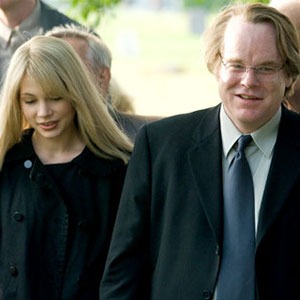 Sony Pictures Classics
Sony Pictures ClassicsReview in a Hurry: An ambitious art-house pic written and directed by Charlie Kaufman (Being John Malkovich, Adaptation) that's as heart-wrenching as it is mind-bending.
The Bigger Picture: Caden Cotard (Philip Seymour Hoffman) is afraid he's going to die. Justifiably so—he's human, after all—but his fear is so overwhelming that it's getting in the way of not only his life but everyone around him.
A director with an ambivalent, unsupportive wife (Catherine Keener) and a career doing jejune regional theater, Caden suffers from a debilitating series of seemingly random ailments. Most are physical, but one is a little more metaphysical: he's paralyzed by existence, moving in a fugue from month to month and year to year, continually discovering that the increasingly absurd events of his life have left him behind.
Thankfully, this is more distracting to Caden than to the audience—his condition may seem confusing at first, but there's plenty of time to suss out what Kaufman's after. Practically a lifetime, in fact—if nothing else, Synecdoche, New York lays bare the scope of an entire human life.
However miserable it may be, Caden's Job-like existence is artfully managed to be less than zero-sum. For every advance (an opportunity to realize his greatest artistic aspirations), there's a greater loss (the absence of wife and child); for every quirky or surreal touch (too many to count!), there's a moment of devastatingly real, resonant human emotion (almost too many to bear!).
It's this delicate balancing act that makes the film a triumph; for all the convolutions and recursions, Synecdoche, New York returns always to simple themes of loss and longing. Kaufman's prodigious imagination and focus allow him to construct a big picture—very, very big—while, aided by a stellar cast and some ingenious set designers, he gets even the most microscopic of details to ring true. It's hard to believe this is his directorial debut—harder still to think he might one day better it.
The 180—a Second Opinion: If you're not interested in plumbing the potential depths of human despair, you'll spend a lot of time wishing Caden would hurry up and die, since it's obvious you're not going anywhere until he does. And if the intricacies of the storyline don't move you, it could all seem very lather-rinse-repeat.